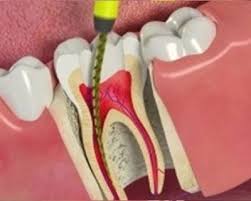What is Root Canal Treatment? Root canal treatment or also referred to as oral surgery is a surgical procedure aimed at correcting conditions that cause damage to the roots of the teeth. The treatment can be done by dentists who are not members of the organization. Root canal treatment is often used to treat complicated dental conditions such as adult enamelitis (a condition where the protective layer of enamel on the teeth is worn off), abscesses, periodontal diseases and conditions of the gums surrounding the teeth. Sometimes, patients require root canal treatment for other reasons such as cavities, serious decay, damaged nerves or toothaches.
Root Canal Treatment in Noida involves the surgical extraction of diseased or infected teeth to be replaced by healthy and functional teeth; this process is called a root canal or dentofacial surgery. The procedure has become very popular over the past few years because of its effectiveness and success rate in dealing with conditions like adult enamelitis, periodontitis, and other forms of dental decay and oral illnesses. In addition, in recent years, root canal treatment has grown in popularity because of Hollywood’s focus on dental hygiene and for aesthetic reasons.
Dental decay starts from a damaged or abnormally growing tooth called a root canal. The pulp of the affected tooth then covers the exposed ends of the diseased or infected tooth’s nerve center. As this process occurs, the nerves may cause pain and sensitivity to different parts of the body. This is why root canal treatment is often required to relieve pain and irritation caused by infected roots, bones and tissues.
A dentist in Noida usually performs root canal treatments. When a person has an infected tooth, the treatment procedure involves removing the infected tooth and all its contaminated tissue and fleshy parts. This tissue is then sent to a laboratory for microscopic analysis. Once the lab reports its findings, your dentist will then determine if root canal treatment will be appropriate. He or she will likely recommend that you get rid of your tooth rather than waiting for a root canal treatment to perform.
Root canal treatment and endodontic procedures differ in many ways. First, a root canal requires removal of a healthy tooth to treat an infected root. On the other hand, endodontic treatment requires removal of diseased or malignant tissue from the root. Second, endodontic procedures require more anesthesia and longer hospital stays than a typical root canal treatment. Third, endodontic procedures also cost more than a typical teeth cleaning procedure.
If you choose to have an endodontic treatment, you may be advised to have your infected pulp extracted as well. This extraction may involve a small surgical procedure or simple extraction using an endodontic drill. Depending on the root canal procedure you have, it might take several months before the infected pulp can be completely removed from your tooth.
Root canal treatments don’t always remove the affected tissue. Sometimes the affected tissue is simply sealed closed to prevent further infection. In these cases, a temporary filling material, such as acrylic or composite material, is used to fill the cavity until permanent dental restoration takes place. While the filling serves to prevent infection, it isn’t always effective, resulting in a buildup of bacteria and other material that can lead to even more tooth decay and inflammation.
Root canal treatments are often performed by a dentist with training and experience in performing this procedure. An endodontist typically has years of dental practice. Because of this, he or she will know how to fill the tooth cavity to prevent infection and buildup of debris. Proper treatment can save the tooth in some cases and save your overall health. When choosing a root canal procedure, make sure you understand what your chances are for tooth damage, inflammation, and other problems.

